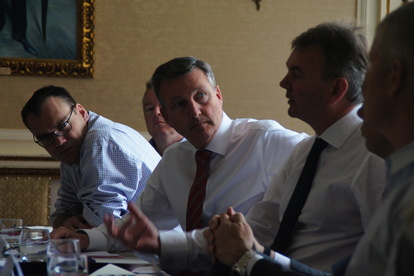Expert: Blair Anderson, Dimensional Fund Advisors Facilitator: Martyn Laverick
Headlines:
When asked if they see the Consumer Duty as an exercise they must go through to justify their current charging structure and services, or if they see it as reinventing how they charge and what they offer, the views were:
- At this stage, looking to demonstrate that the existing business model meets the Consumer Duty rules was the overriding opinion
- Some saw it as having a longer-term impact and they were looking at how they charge and the services they offer, with the view to potentially launching/bringing in new structures in the future if they had to
- Several firms will be running both side by side i.e., justifying the existing model but preparing new potential services and charging structure
Context:
The Advice Gap will widen
Concern from many attendees that this will increase the base cost at which clients are profitable and stop them from taking on smaller clients. This, coupled with the potential of having to cap charges at the higher end, meant non-profitable clients could not be entertained.
Firms being driven to higher end clients will leave more clients unable to afford the fees for advice leaving them either to self-serve or to find hybrid/robo firms that might be able to look after them.
The Future of Charging Structures – is ad valorum dead?
Given most firms in the room charge on an ad valorum basis it was interesting to hear that there were concerns that this way of charging could disappear. There are already plenty of examples of different charging models in the market and some attendees expressed a view that they saw this way of charging ending.
No one was sure as to the speed that this could happen. The view was that some newer entrants could come into the market with a new type of charging structure, which over time could mean that firms would need to adapt or die.
Some firms were working on different structures and working out how viable they were or not.
Whilst not everyone was on the same page it is nevertheless worth noting that this is a key area to keep a close eye on in the coming months/years as firms get to grips with Consume Duty.
Data…. what data?
Data is still a main focus for businesses. Have they identified the correct data they need to collect as a firm and how easy it is to obtain this?
As the attendees represented some of the largest businesses in the UK, most firms have identified the type of data they need to collect. They are now in the steps of building access to this data where it may not have existed before. For example, feedback from their clients was viewed as key. What shape did it take i.e., Net Promoter Score or other forms, how often was it asked for etc.
What all firms recognised is that you cannot just rely on client feedback as proof of good outcomes and happy clients! This will need to be a part of a bigger picture of being able to meet all the Consumer Duty criteria.
One role firms discussed was that of a data processor and some firms had already gone down the route of hiring individuals for this role. Many were in the process of scoping out the role ahead of recruiting. The view was that this role will be absolutely key going forward in order to control and understand the various data types that the advisory firm will need to have, in order to serve their clients in the new world and demonstrate how they are adding value.
For the firms and attendees at this event they are all focussed on Consumer Duty and have been running a resourced project for some time in order to meet the deadline. Their view is that it will still be tight but feel confident that they will be able to meet what the regulator is asking.
Key takeaways:
- It would be useful to understand any work the Regulator has done around the impact of the Consumer Duty on the advice gap as the view is not a positive one for the UK population seeking advice
- It would also be worth running a session like this for the medium sized advisory firms to see how they are coping with the same issue. Whilst the size of the challenge may be different for them, they will not have the band width, resources or possible financials to run the project in the same way as the larger firms


